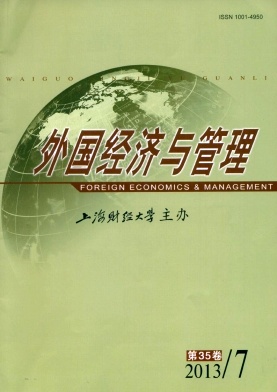薪酬制度分选效应研究综述
外国经济与管理 2013 年 第 35 卷第 07 期, 页码:54 - 62
摘要
参考文献
摘要
本文首先运用信号理论和个人—组织匹配理论对薪酬制度的分选效应进行了理论解释,然后介绍了现有研究从个体能力和风险偏好方面对薪酬分选效应进行的经济学模型化探讨;接下来通过回顾相关实证研究分析了薪酬制度如何通过个体能力、心理行为及人口统计学特征等因素发挥分选作用,最后对薪酬分选效应的未来研究方向进行了展望。
[1]Baruch Y,et al.Performance-related pay in Chinese profes-sional sports[J].International Journal of Human Resource Management,2004,15(1):245-259.
[2]Bowers K S.Situationism in psychology:An analysis and cri-tique[J].Psychological Review,1973,80(5):307-336.
[3]Bowles S,et al.The determinants of earnings:A behavioral approach[J].Journal of Economic Literature,2001,39(4):1137-1176.
[4]Bozionelos N and Wang L.An investigation on the attitudes of Chinese workers towards individually based performance-re-lated reward systems[J].International Journal of Human Re-source Management,2007,18(2):284-302.
[5]Cable D M and Judge T A.Pay preferences and job search de-cisions:A person-organization fit perspective[J].Personnel Psychology,1994,47(2):317-348.
[6]Cadsby C B,et al.Sorting and incentive effects of pay for per-formance:An experimental investigation[J].Academy of Management Journal,2007,50(2):255-283.
[7]Chow C W.The effects of job standard tightness and compen-sation scheme on performance:An exploration of linkages[J].Accounting Review,1983,58(4):667-685.
[8]Cornelissen T,et al.Performance pay,risk attitudes and job satisfaction[R].SOEP paper,2008.
[9]Dohmen T and Falk A.Performance pay and multidimensional sorting:Productivity,preferences and gender[J].American E-conomic Review,2011,101(2):556-590.
[10]Dubinsky A J,et al.Importance of alternative rewards:Im-pact of managerial level[J].Industrial Marketing Manage-ment,2000,29(5):427-440.
[11]Eriksson T,et al.Self-selection and the efficiency of tourna-ments[J].Economic Inquiry,2009,47(3):530-548.
[12]Gale D and Shapley L S.College admissions and the stability of marriage[J].American Mathematical Monthly,1962,69(1):9-15.
[13]Gerhart B and Milkovich G T.Organizational differences in managerial compensation and financial performance[J].Aca-demy of Management Journal,1990,33(4):663-691.
[14]Goktan A B and SaatogˇluY.The effect of cultural values on pay preferences:A comparative study in Turkey and the United States[J].International Journal of Management,2011,28(1):173-184.
[15]He W,et al.Rewards-allocation preferences of Chinese em-ployees in the new millennium:The effects of ownership re-form,collectivism,and goal priority[J].Organization Science,2004,15(2):221-231.
[16]Kachelmeier S J and Williamson M G.Attracting creativity:The initial and aggregate effects of contract selection on crea-tivity-weighted productivity[J].Accounting Review,2010,85(5):1669-1691.
[17]Keon T L,et al.Image congruence and the treatment of difference scores in organizational choice research[J].Human Relations,1982,35(2):155-166.
[18]Lazear E P and Rosen S.Rank-order tournaments as opti-mum labor contracts[J].Journal of Political Economy,1981,89(5):841-864.
[19]Lazear E P.Salaries and piece rates[J].Journal of Business,1986,59(3):405-431.
[20]Lazear E P.Output-based pay:Incentives,retention or sor-ting?[R].IZA Discussion Paper,2003.
[21]Lee H J,et al.Employee preference for performance-related pay:Predictors and consequences for organizational citizenship behavior in a Japanese firm[J].International Journal of Hu-man Resource Management,2011,22(10):2086-2109.
[22]Niederle M and Vesterlund L.Do women shy away from competition?Do men compete too much?[J].Quarterly Journal of Economics,2007,122(3):1067-1101.
[23]Ray K.Sorting effects of performance pay[R].Working Pa-per,McDonough School of Business,Georgetown University,2011.
[24]Rothschild M and Stiglitz J.Equilibrium in competitive insu-rance markets:An essay on the economics of imperfect infor-mation[J].Quarterly Journal of Economics,1976,90(4):629-649.
[25]Salop J and Salop S.Selfselection and turnover in the labor market[J].Quarterly Journal of Economics,1976,90(4):619-627.
[26]Spence M.Job market signaling[J].Quarterly Journal of E-conomics,1973,87(3):355-374.
[27]Teyssier S.Experimental evidence on inequity aversion and self-Selection between incentive contracts[R].Working Pa-per,Institute of Economic Theory and Analysis(GATE),France,2008.
[28]Waller W S and Chow C W.The self-selection and effort effects of standard-based employment contracts:A framework and some empirical evidence[J].Accounting Review,1985,LX(3):458-476.
[29]Zenger T R.Why do employers only reward extreme per-formance?Examining the relationships among performance,pay,and turnover[J].Administrative Science Quarterly,1992,37(2):198-219.
[30]龙立荣等.员工对企业经济性薪酬的内隐分类与偏好研究[J].科学学与科学技术管理,2010,31(12):154-162.
[2]Bowers K S.Situationism in psychology:An analysis and cri-tique[J].Psychological Review,1973,80(5):307-336.
[3]Bowles S,et al.The determinants of earnings:A behavioral approach[J].Journal of Economic Literature,2001,39(4):1137-1176.
[4]Bozionelos N and Wang L.An investigation on the attitudes of Chinese workers towards individually based performance-re-lated reward systems[J].International Journal of Human Re-source Management,2007,18(2):284-302.
[5]Cable D M and Judge T A.Pay preferences and job search de-cisions:A person-organization fit perspective[J].Personnel Psychology,1994,47(2):317-348.
[6]Cadsby C B,et al.Sorting and incentive effects of pay for per-formance:An experimental investigation[J].Academy of Management Journal,2007,50(2):255-283.
[7]Chow C W.The effects of job standard tightness and compen-sation scheme on performance:An exploration of linkages[J].Accounting Review,1983,58(4):667-685.
[8]Cornelissen T,et al.Performance pay,risk attitudes and job satisfaction[R].SOEP paper,2008.
[9]Dohmen T and Falk A.Performance pay and multidimensional sorting:Productivity,preferences and gender[J].American E-conomic Review,2011,101(2):556-590.
[10]Dubinsky A J,et al.Importance of alternative rewards:Im-pact of managerial level[J].Industrial Marketing Manage-ment,2000,29(5):427-440.
[11]Eriksson T,et al.Self-selection and the efficiency of tourna-ments[J].Economic Inquiry,2009,47(3):530-548.
[12]Gale D and Shapley L S.College admissions and the stability of marriage[J].American Mathematical Monthly,1962,69(1):9-15.
[13]Gerhart B and Milkovich G T.Organizational differences in managerial compensation and financial performance[J].Aca-demy of Management Journal,1990,33(4):663-691.
[14]Goktan A B and SaatogˇluY.The effect of cultural values on pay preferences:A comparative study in Turkey and the United States[J].International Journal of Management,2011,28(1):173-184.
[15]He W,et al.Rewards-allocation preferences of Chinese em-ployees in the new millennium:The effects of ownership re-form,collectivism,and goal priority[J].Organization Science,2004,15(2):221-231.
[16]Kachelmeier S J and Williamson M G.Attracting creativity:The initial and aggregate effects of contract selection on crea-tivity-weighted productivity[J].Accounting Review,2010,85(5):1669-1691.
[17]Keon T L,et al.Image congruence and the treatment of difference scores in organizational choice research[J].Human Relations,1982,35(2):155-166.
[18]Lazear E P and Rosen S.Rank-order tournaments as opti-mum labor contracts[J].Journal of Political Economy,1981,89(5):841-864.
[19]Lazear E P.Salaries and piece rates[J].Journal of Business,1986,59(3):405-431.
[20]Lazear E P.Output-based pay:Incentives,retention or sor-ting?[R].IZA Discussion Paper,2003.
[21]Lee H J,et al.Employee preference for performance-related pay:Predictors and consequences for organizational citizenship behavior in a Japanese firm[J].International Journal of Hu-man Resource Management,2011,22(10):2086-2109.
[22]Niederle M and Vesterlund L.Do women shy away from competition?Do men compete too much?[J].Quarterly Journal of Economics,2007,122(3):1067-1101.
[23]Ray K.Sorting effects of performance pay[R].Working Pa-per,McDonough School of Business,Georgetown University,2011.
[24]Rothschild M and Stiglitz J.Equilibrium in competitive insu-rance markets:An essay on the economics of imperfect infor-mation[J].Quarterly Journal of Economics,1976,90(4):629-649.
[25]Salop J and Salop S.Selfselection and turnover in the labor market[J].Quarterly Journal of Economics,1976,90(4):619-627.
[26]Spence M.Job market signaling[J].Quarterly Journal of E-conomics,1973,87(3):355-374.
[27]Teyssier S.Experimental evidence on inequity aversion and self-Selection between incentive contracts[R].Working Pa-per,Institute of Economic Theory and Analysis(GATE),France,2008.
[28]Waller W S and Chow C W.The self-selection and effort effects of standard-based employment contracts:A framework and some empirical evidence[J].Accounting Review,1985,LX(3):458-476.
[29]Zenger T R.Why do employers only reward extreme per-formance?Examining the relationships among performance,pay,and turnover[J].Administrative Science Quarterly,1992,37(2):198-219.
[30]龙立荣等.员工对企业经济性薪酬的内隐分类与偏好研究[J].科学学与科学技术管理,2010,31(12):154-162.
引用本文
丁明智, 张正堂, 程德俊. 薪酬制度分选效应研究综述[J]. 外国经济与管理, 2013, 35(7): 54–62.
导出参考文献,格式为:





 7077
7077  263
263

